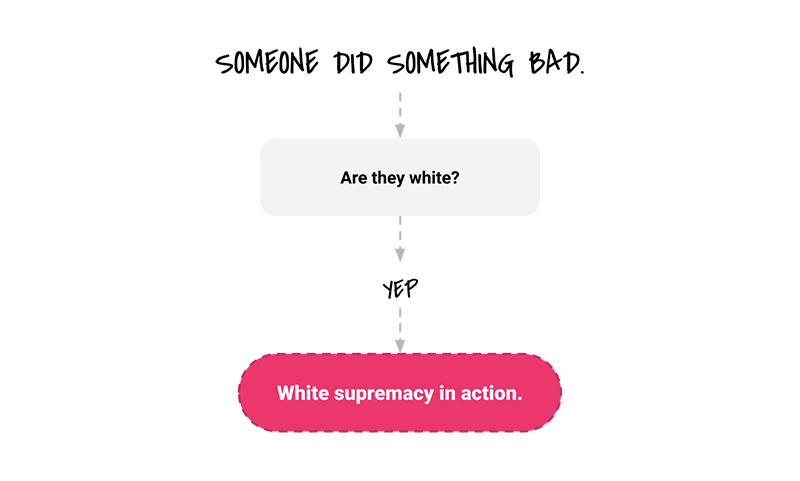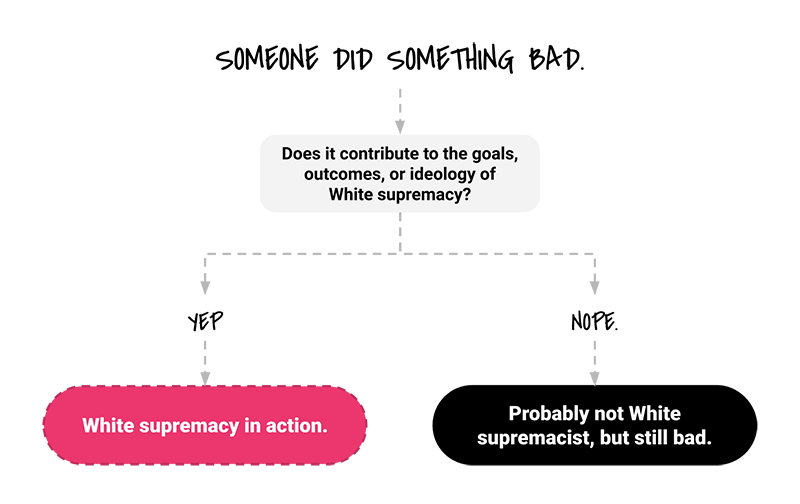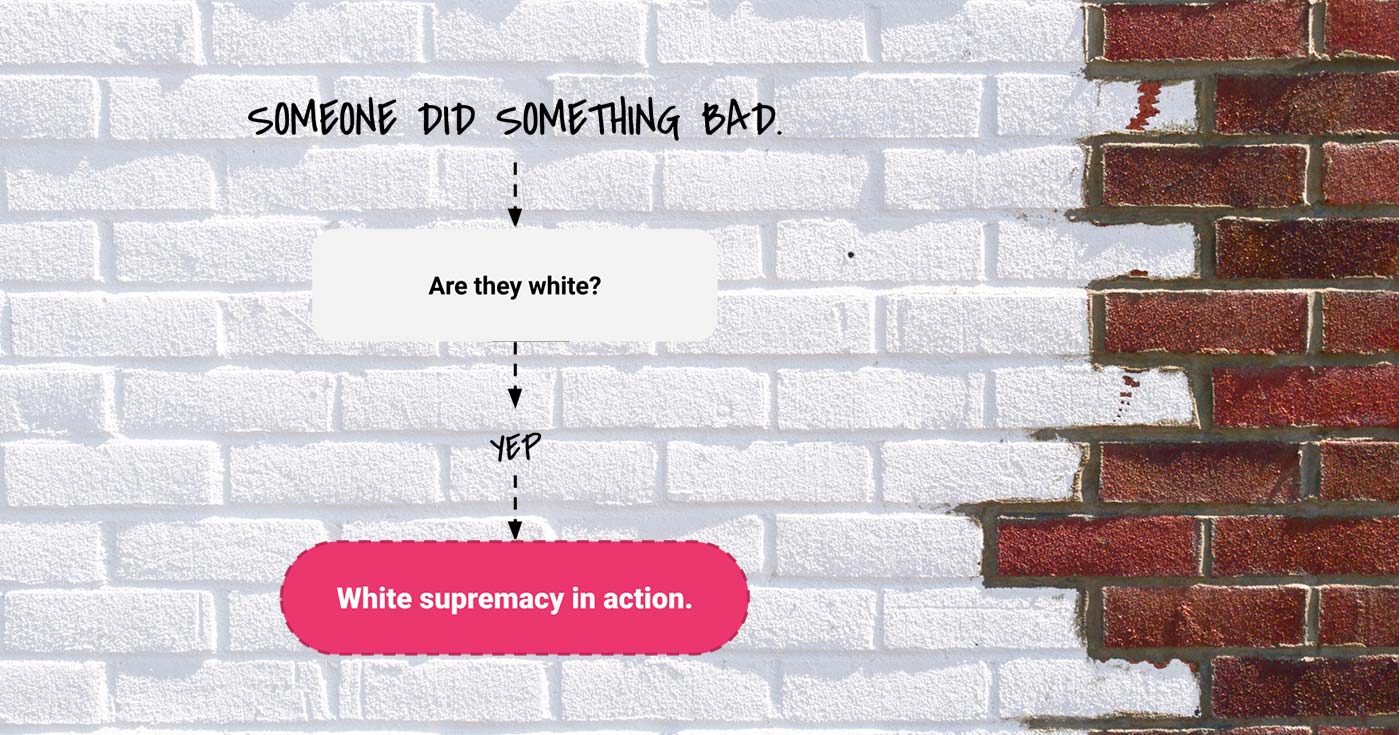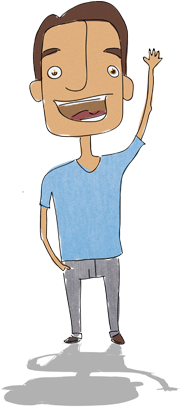Recently, I’ve been noticing this weird trend. It’s become prevalent within the social justice movement, and I haven’t seen anyone else flag it. I brought it up in the context of our Social Justice, Minus Dogma Course + Community, and it turns out other people are noticing it too. So let’s flag it.
The short version is this:
A lot of people are using domination/oppression language (e.g., “white supremacist”, “patriarchal”) as synonyms for “bad” and marginalization/anti-oppression language (e.g., “indigenous,” “decolonized,” “feminist”) as synonyms for “good” — devoid of any meaningful connection to the actual structure, system, or culture they’re mentioning.
My guess is that it’s a combination of our over focusing on “-ists” instead of “-isms” plus the “social justice power inverse,” but I’ll leave the detective work up to you.
Why highlight this at all? In short, because actual, sincere, real-life White supremacy is on the rise, and we need to be able to call it when we see it.
Calling things “White supremacist” that aren’t creates a lot of unhelpful noise.
I wrote this article a few days before we got a blazingly clear example of White supremacy in action, when U.S. President Donald Trump went on a “go back to your country” rant against several members of congress, all of whom are women of color.
Being careful to use the phrase “White supremacy” correctly would allow a criticism of Trump’s rant, and other White supremacist actions, to be held as distinct from general criticisms of Trump.
Both are totally valid, by the way! However, we need to know which basket we’re putting our eggs into.
We need to be able to separate “I don’t like what you’re saying” from “What you’re saying is advancing White supremacy and ethnic cleansing.”
And right now we’re not doing a good job of that, at all.
I’ll explain what I’m talking about in more detail, then talk about a few of the reasons I think this is (deeply) unhelpful.
I’d be curious to hear what you think, if you’re also noticing this. We’ll make space for that, too.
“White Supremacist” doesn’t mean a “White person doing something bad”
Let me first say that, overall, it’s great that more people are becoming comfy using phrases like “white supremacist.”
The same goes for words like “patriarchal,” “colonial,” “heterosexist,” etc. They’re useful words that can be used to pinpoint exactly what we’re talking about, concerned about in society, and wanting to change.
(If we could just add “capitalist” to our comfort zone, we might even make bell hooks proud.)
The issue I’m flagging here is not the use of the phrase “white supremacist” (or any of these other words I’m lumping together as domination/oppression language).
The issue is people using these words like duct tape, sticking them to every problem they notice.
Here’s what it looks like in general:
Someone does something harmful. Are they White? “White supremacy in action.”
Someone shares a terrible idea. Are they a man? “Patriarchy in action.”
An organization has a White man executive director and does something unhelpful. “White supremacist patriarchy.”
Here it is in flowchart form:

And the flipside of the same coin is also true, where we see people attributing anything positive someone does or shares to a marginalized identity or anti-oppression -ism. For example, a “better” approach to something becomes labeled as the “feminist” approach.
As a few concrete examples, I’ve recently seen high profile, “social justice famous,” or virally-shared takes that included:
- Democracy equated with White supremacy
- Exercising and being a physical trainer equated with literal Nazism
- Facilitating a Q&A session in a thoughtful way equated with feminist decolonialization
Don’t focus too much on those examples if you have seen your own and they’re different. I just pulled them from the top of my mind as things I’ve seen in the last few days, and wanted to share them for people for whom this was all too abstract.
The examples don’t matter as much as the phenomenon in general, which is using loaded oppression language as synonymous with “bad.”
I’m not linking to specific examples, because I refuse to publicly drag people, especially people who are working with the intent of social justice. Examples of this are abound in my social media feeds, as well as the mainstream social justice blogs/sites I read, so I’m guessing the same is true for you, if you’re a person reading this site.Okay, so hopefully this all makes sense so far. Let me say another big disclaimer before I go on:
A lot of times this is all true.
That is, I’m not saying that white people doing bad things is never an example of white supremacy. A lot of bad things white people do, and bad ideas white people have, are white supremacist.
I’m also not saying that a better approach to something isn’t feminist. A lot of better approaches are feminist.
(Repeat the above examples for every parallel domination/oppression and marginalization/anti-oppression axis in your head, and I’ll stand by it. I’m just going to save you the reading time, and the earth the carbon emissions, and not type those 1,000+ words.)
Here’s the part I’m flagging:
A lot of times it’s not true.
White people do stupid stuff that isn’t White supremacist. Men have terrible ideas that aren’t patriarchal. And there are great ideas that aren’t feminist. Etc.
Further, and more prickly, advancing White supremacy isn’t merely the domain of white people.
Black people, indigenous people, and people of color in general can all advance White supremacy, can share White supremacist ideas, and can do bad things that are White supremacist.
Us using “White supremacist” as a synonym for “White person doing stupid shit” erases those realities, which is one of the problems that led me to flagging this. But it’s not the big problem.
What’s the big problem?
If it’s true a lot of the time, what’s the harm in labeling things as “white supremacist” or “patriarchal” when they’re bad?
And if we want to advance the goals of feminism, why not arbitrarily label good things as “feminist”?
The big problem here is that when you use a word to mean everything, it stops meaning anything.
We’re diluting the usefulness of these otherwise super useful, targeted, precise words when we use them to describe everything bad.
As a person who spends a lot of time trying to clarify language for people, writing definitions, and updating meanings of terminology as it shifts with culture, I have both a unique vantage point and ax to grind on this front.
Words have power. Language shapes our realities as much as it reflects them. Every time a person uses a word incorrectly it erodes the power of that word.
Because what we’re doing here — trying to advance the goals of social justice, move towards equity and liberation — matters deeply to us, so should every misstep.
Calling things White supremacist that aren’t ultimately helps White supremacy, and hinders the progress of social justice.
Ditto goes for every other “bad thing” we falsely attribute to an “-ism” we’re trying to unravel.
And I’m not just talking “Boy Who Cried Wolf”-style either. Let’s work through some of the other problems within the frame of a proposed solution.
Proposing an Alternative
What if, instead of the algorithm above, we committed the following:

White supremacy, patriarchy, colonialism, and the rest are all ideologies and belief systems. They are social projects with specific goals. They’re not synonyms for “evil.”
But how can we know if something contributes to the goals, outcomes, or ideology of White supremacy?
We’ll have to discuss it, and figure it out ourselves.
If we discuss, with other social justice people, whether or not something said or done is “contributing to the goals, outcomes, or ideology of White supremacy”, and not just something we disagree with, dislike, or find gross, I have full faith we land on the truth.
And that will, in the long run, benefit social justice and our individual efforts — whether it turns out the thing was or wasn’t White supremacy in action.
When we determine that it is, we’ll have spent time figuring it out, questioning, digging in, proposing alternatives, and getting to the bottom of the issue.
And this time spent isn’t time wasted, it’s practice! Because anyone else we talk to about that thing will likely have some of those same questions, counterpoints, and skepticisms, and we’ll already have an answer in mind that can move the conversation from that sticking point.
When we determine that it’s not, we’ll have spared ourselves a ton of wasted time advocating something to other people an idea that — when we really dug into it — wasn’t rooted in something meaningful. That’s not just time saved, but an opportunity cost of trust and respect avoided.
Regardless of the outcome, discussing whether or not something actually is White supremacist will have another benefit…
We can’t just fall back on dogma.
Social Justice Dogma shows up in our lives in lots of ways, and many of those prevent us from asking questions.
If someone says something is racist, our knee-jerk reaction is to distance ourselves as far away from it as possible, not to ask questions and get to the bottom of it.
We don’t often ask “Is this really White supremacy in action? What if it were something else?”
If we question it, we run the risk of being questioned ourselves: “Are you enabling racism? Have you internalized White supremacy? Why are you defending a racist?”
So we don’t question it. We just jump in and support. That’s all the dogma allows us to do.
While this might benefit us individually, it hinders us as a movement. Because when we toe the line of dogma we’re more concerned with preserving our relationships, or not being “canceled” or outcast, and we center our individual status instead of the cause we’re advancing.
In this way, the social justice dogma is a trap: it always gives us an answer, but sometimes what we really need is the ability to ask constructive questions.
If we keep our cause in mind, the movement front and center, the path seems forward becomes clear.
As soon as we start questioning things, and getting to the root of an issue, we’re pushing back against the dogma and creating a chance for living social justice.
Cleaning up the garbage we notice.
For a moment, imagine that every time we notice an injustice — something standing in the way of social justice, or gender equity, or sexual liberation — we’re flagging a piece of garbage in a park.
We’re walking around and making mental notes. “There’s an empty potato chip bag by that tree. A crumpled can under that bench. Some styrofoam floating in that pond.” And so on.
And we’re walking around the park making those notes because we plan to clean up the park. But first we’re getting a sense of the tools we need. How many trash bags, nets for the water, little poker things for the cans, etc.
Would it be helpful if we mistook a leaf for a potato chip bag? Or some pond scum for styrofoam? It would not.
If we want to actually rid the park of trash, we’d have to focus on the trash. We’d be wasting our time and resources trying to scoop up everything that looks kinda like trash.
We can see social justice, and our efforts within the social justice movement, in this same way.
Every time we call something “White supremacist” we’re creating a task for ourselves, something we need to clean up, in order to advance the cause of equity and racial justice.
We can’t dismantle White supremacy unless we can accurately spot it in action. To do that we need to be able to ask questions, and be willing to find the answers.
We’ll only benefit from focusing on the real problems.
To Recap:
Because I’m concerned this article is one of those that’s likely to get misinterpreted (and there’s a non-zero chance it will un-ironically be labeled White supremacist itself), let’s recap.
I want to be absotively sure you know what I’m saying here, and — if it motivates you — that it pushes you in the direction I’m hoping to nudge.
So, here’s what I’m saying:
- We often use the phrase “White supremacist” simply to mean “a white person did something bad.”
- Some bad things aren’t White supremacist (or patriarchal, or sexist, cissexist, heterosexist, ableist, or any-ist).
- Being careless about the distinction enables actual White supremacy (and other -isms) by providing cover and distraction.
- Being clear about the distinction between “White supremacy” and “bad things that aren’t actually White supremacy” will help us move justice movements forward.
- So let’s be intentional with how and when we choose to call something “White supremacy” (and make sure that the thing in question is actually White supremacy in action).
Hopefully that shines through in the article above.
Now I’d like to hear what you have to say! You can respond to me directly by clicking here (anonymous, quick, & easy)


